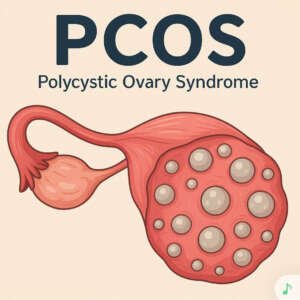
PCOS, or Polycystic Ovary Syndrome, is a hormonal condition that affects millions of women around the world. Despite its prevalence, it remains misunderstood and often undiagnosed. It is crucial to raise awareness and promote understanding to ensure those affected can receive the right care and support. Especially, women are struggling with PCOS and infertility.
- PCOS is a common endocrine and metabolic disorder, making it one of the most frequent metabolic diseases affecting women today! Typical signs and symptoms of PCOS include:
- Irregular menstruation (when not taking oral contraceptives)
- Very light periods
- Excess weight (even if overweight by only 5-10%)
- Excessive body hair (especially on the face, pubic region, and abdomen)
- Acne
- Elevated testosterone levels
- Infertility
- Other associated conditions may include insulin resistance (IR), type 2 diabetes, high blood pressure, high cholesterol, and cardiovascular disease.
- Asian women have a higher prevalence of PCOS compared to other ethnic groups. Among women of reproductive age, PCOS affects up to 10% and significantly impacts fertility, making it one of the leading causes of infertility.
- Mechanism of PCOS involves excessive production of androgens, which inhibits normal ovulation. Women with PCOS do not release a mature egg each month but may develop multiple small fluid-filled cysts in the ovaries, further increasing androgen levels.
- Treatment Options: Several approaches can mitigate the effects of PCOS, such as improving nutrition, increasing physical activity, reducing cholesterol levels, and avoiding tobacco and other toxins. In addition, supplements like inositol, metformin, and vitamin D may help regulate menstruation and improve fertility. For those struggling with natural conception, in vitro fertilization (IVF) is often the first-choice treatment.
Optimizing IVF Strategies for Women with PCOS
Here’s a summary of the key findings from Kotlyar and Seifer’s article, ” Women with PCOS who undergo IVF, a Comprehensive review of therapeutic Strategies for Successful Outcomes.”
Key Themes & Findings:
- Pre-IVF Preparation
- Lifestyle adjustments: Losing 5-10% of body weight and increasing physical activity can significantly improve reproductive outcomes.
- Supplementary medications:
- Inositol: A natural insulin sensitizer, especially effective when combined with folic acid and melatonin, improving egg quality and pregnancy rates.
- Metformin: May reduce the risk of ovarian hyperstimulation syndrome (OHSS) and aid in weight loss, though its impact on egg yield and pregnancy rates is unclear.
- Vitamin D: While deficiency is associated with PCOS, more research is needed to confirm its benefits for IVF outcomes.
- Ovarian Stimulation
- Stimulation Protocols: GnRH antagonist protocols offer lower OHSS risk, greater cycle flexibility, and comparable pregnancy rates to traditional long-acting GnRH agonist protocols.
- Triggering Methods: GnRH agonist triggers reduce OHSS risk better than hCG triggers but may require additional luteal support to maintain pregnancy rates.
- Fresh vs. Frozen Embryo Transfer: The “freeze-all” strategy, followed by frozen embryo transfer (FET), is recommended to improve live birth rates and reduce miscarriage and OHSS risks.
- Frozen Embryo Transfer (FET)
- Programmed vs. Natural Cycle FET: Programmed FET with hormone replacement offers flexibility, while letrozole-stimulated natural cycle FET may provide similar pregnancy rates with reduced risks of hypertensive disorders during pregnancy.
- Obstetric & Perinatal Outcomes
- PCOS patients undergoing IVF, especially those who are overweight or obese, face higher risks of pregnancy complications such as gestational hypertension.
- Strategies like “freeze-all” transfers and preconception weight management can significantly reduce these risks.
- Future Research Directions
- Further studies are needed to improve endometrial receptivity in PCOS patients.
- Continued exploration is essential to reduce pregnancy complications associated with programmed FET protocols.
Conclusion
This review highlights several evidence-based interventions that enhance IVF success rates and reduce risks for women with PCOS. A holistic approach—including lifestyle changes, supplementation, personalized ovarian stimulation protocols, and strategic embryo transfer choices—can significantly improve the journey toward a healthy pregnancy for PCOS patients.
